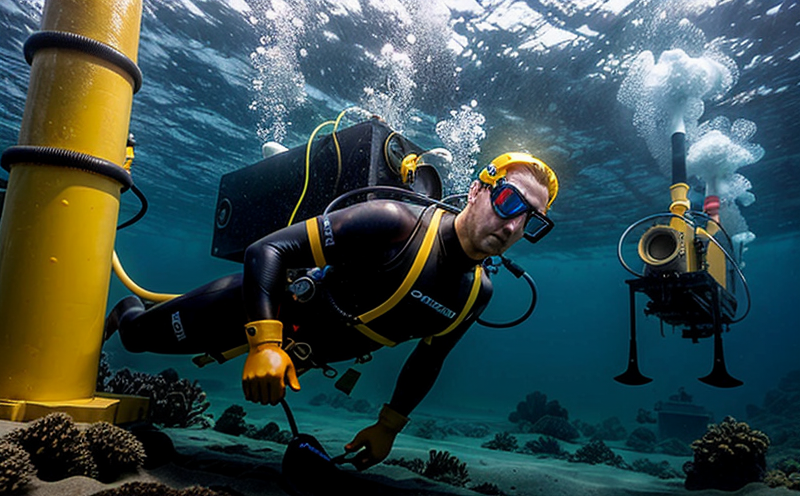ISO 13628-11 Subsea Well Intervention Equipment Testing
The ISO 13628 series is dedicated to subsea well intervention equipment testing, aimed at ensuring the reliability and safety of equipment used in offshore oil and gas operations. The specific test under discussion here, ISO 13628-11 Subsea Well Intervention Equipment Testing, focuses on the mechanical integrity and performance evaluation of tools and components involved in well intervention activities.
The scope of this service encompasses a wide range of testing parameters that are critical for ensuring compliance with international standards. The equipment tested includes but is not limited to blowout preventers, packers, and other specialized tools used during subsea operations. These tests are essential as they ensure that the equipment can withstand harsh environmental conditions, including high pressures and temperatures, which are characteristic of deep-sea environments.
The test procedure involves a series of mechanical load applications designed to simulate real-world operational scenarios. This includes static loading to assess structural integrity under various loads, fatigue testing to evaluate long-term durability, and dynamic loading tests to check the equipment's response to sudden changes in pressure or temperature.
For specimen preparation, the process begins with careful selection of materials that closely match those used in actual manufacturing processes. Specimens are then fabricated according to specific dimensions and tolerances outlined in ISO 13628-11 guidelines. This ensures that the test results accurately reflect the performance capabilities of the equipment.
The instrumentation used for this testing is state-of-the-art, capable of providing precise measurements during each phase of the test. Advanced sensors are employed to monitor critical parameters such as stress levels, strain rates, and temperature changes within the specimen. This data is crucial in identifying potential weaknesses or areas requiring improvement before deployment.
The acceptance criteria for this testing procedure are strictly defined according to ISO 13628-11 specifications. Equipment must pass all mechanical tests without failure under specified conditions. Failure includes any sign of permanent deformation, cracking, or loss of functionality during the test cycle.
Compliance with these stringent standards not only ensures operational safety but also enhances overall efficiency by minimizing downtime and preventing costly repairs at sea. By adhering to international norms like ISO 13628-11, manufacturers can gain competitive advantages while maintaining high standards of quality and reliability.
- Mechanical load applications simulating real-world conditions
- Static loading tests for structural integrity assessment
- Fatigue testing to evaluate long-term durability under cyclic loads
- Dynamic loading tests to assess response to sudden changes in pressure or temperature
- Advanced sensors for precise measurement of critical parameters during each phase of the test
- Precision instrumentation ensuring accurate data collection and analysis
- Stringent acceptance criteria based on ISO 13628-11 specifications guaranteeing operational reliability
Benefits
The benefits of adhering to the ISO 13628-11 Subsea Well Intervention Equipment Testing include enhanced safety, increased efficiency, and improved reliability of equipment used in offshore oil and gas operations. By undergoing rigorous testing according to these international standards, manufacturers can ensure that their products meet the highest quality benchmarks.
Enhanced Safety: Ensuring compliance with ISO 13628-11 guarantees that all tested equipment meets stringent safety requirements. This reduces the risk of accidents or failures during critical subsea operations, thereby protecting both personnel and assets.
Increased Efficiency: Testing adheres to international standards helps streamline production processes by identifying potential issues early in development stages. This leads to more efficient manufacturing practices resulting in faster delivery times for new products without compromising on quality.
Improved Reliability: The robust testing procedures ensure that only reliable and durable equipment makes it into the field. This contributes towards maintaining consistent performance levels over extended periods, which is crucial given the demanding nature of subsea operations.
Regulatory Compliance: Adherence to international standards like ISO 13628-11 ensures compliance with regulatory requirements across different jurisdictions worldwide. This simplifies market access for manufacturers and operators who need to meet diverse regulatory frameworks.
Eurolab Advantages
Eurolab, as a leading provider of specialized testing services, brings unparalleled expertise in marine and ship equipment testing. With state-of-the-art facilities equipped with the latest technology, we offer comprehensive support tailored to meet your unique needs.
Our team comprises highly qualified professionals who possess deep knowledge and experience in subsea well intervention equipment testing. Leveraging our cutting-edge infrastructure and advanced methodologies, Eurolab ensures that every test conducted adheres strictly to international standards such as ISO 13628-11.
We pride ourselves on delivering accurate results consistently through meticulous attention to detail throughout each stage of the testing process. Our commitment to excellence translates into reliable data and actionable insights that help drive innovation within your organization.
In addition, Eurolab offers flexibility in terms of project timelines and budget constraints, allowing us to customize solutions based on specific requirements. Whether you require one-off tests or ongoing support for regular inspections, our dedicated team stands ready to assist with all aspects of your testing needs.





